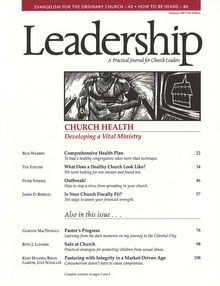Leading isn’t easy for a servant. The problem was best described by Craig Barnes, pastor of National Presbyterian Church in Washington, D.C.
“There was a day when we were clear on what it meant to be a leader,” he writes. “It meant getting to the top of the organization where it was possible to run things. The great power that was attached to that model was easy to abuse, but it also made it easy to get things done, and it was obvious who was in charge.
“That form of leadership has generally been rejected for many years. We criticized the old bosses as ‘hierarchical, top-down managers’ and sought a new model of leadership that would empower, enable, and facilitate the aspirations of even the lowliest in the organization. For a while that sounded pretty good. In time, however, what began as a corrective has become something of a problem itself …
“Leadership has now come to mean satisfying the people. Pastors and elders spend enormous amounts of time and energy responding to complaints. It is important to note that this current infatuation with making people happy is not born out of any humility on the part of the leader. To the contrary, leaders are drawn into this new model because they are anxious about keeping power. Ironically however, those who only give people what they want find themselves not powerful, but enslaved by the competing demands of self-interest groups that cannot all be met …
“The hierarchical models of previous days may have been elitist. But this new ‘I’m just here to give you what you want’ model is even more dangerous, as the story of Aaron’s brief fling with leadership and the golden calf illustrates … There has to be another way.”
What is that better way? I suspect it’s not another leadership style, but becoming a better follower of Jesus.
I’m intrigued that every time Jesus’ disciples staked a position of power, he rebuked them. Their task was simply to follow. Likewise, a pastor’s most vital trait is not talent or charisma. It’s a deep love for Jesus of Nazareth and a longing to follow him. That may mean denying yourself (and the temptation to grasp privileged status) and may mean denying or redirecting people’s requests if they are inconsistent with the kingdom of God.
Henri Nouwen once asked seminarians the thrice-repeated question Peter faced: “Do you love Jesus?”
Most nodded.
Every time Jesus’ disciples staked a position of power, he rebuked them.
“If you say yes,” Nouwen predicted, “it will mean meetings, meetings, and meetings, because the world likes meetings. It means parishioners who only want one thing of you, not to rock the boat. … It means all of that. But it also means anxious hearts waiting to hear a word of comfort, trembling hands eager to be touched, and broken spirits with expectations to be healed … Your life is not going to be easy, and it should not be easy. It ought to be hard, radical, restless; it ought to lead you to places you’d rather not go.”
Like the wilderness. Many of us envision ourselves a Moses, pointing to the Promised Land. But we’re surprised how much time we spend wandering the desert (like Moses after all!).
“I’ve had the exact same conversation about the church parlor at least two hundred times, in three different churches,” Barnes says. “I am willing to risk being a failure for Jesus, and I can certainly handle success. But the one place I didn’t want to go was into the daily meandering of God’s people.”
That, however, is where many of us are called. Being with people in the wilderness is the only way they’ll know the love of Jesus. And not until they know that love will they gain the faith to enter his Promised Land.
Marshall Shelley is senior editor of Leadership.
Excerpts from M. Craig Barnes, “Leadership: The Journey from Humility to Humility,” in reNEWS (9/95). Reprinted by permission.
1997 by the author or Christianity Today/Leadership Journal. For reprint information call 630-260-6200 or contact us.









